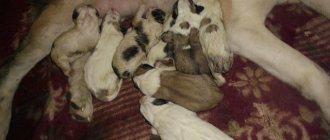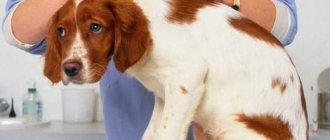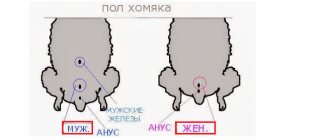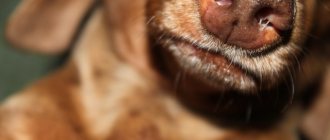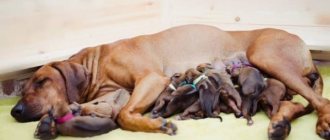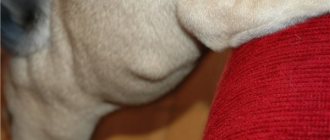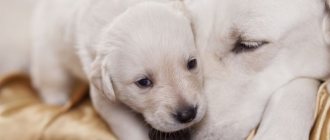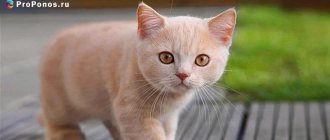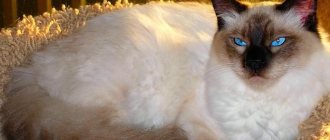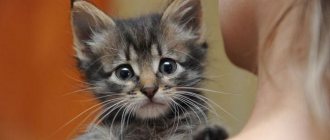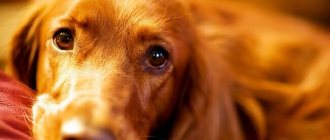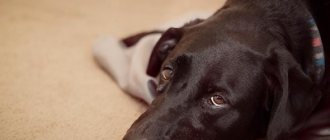Causes of diarrhea in dogs
Diarrhea is loose stool that occurs more than three times a day. Diarrhea is associated with dysfunction of the digestive system, the causes of which may be the following factors:
- Infections and viruses.
- Poor nutrition, including violation of feeding times, unbalanced diet, which leads to a lack of vitamins, minerals and other elements vital for development and health. In addition, the dog should not be fed food that irritates the intestinal and stomach mucosa (spicy, fatty, especially fried, sour, hot), since such food provokes diarrhea, nausea, and vomiting.
- Change of food, new, unusual food for the dog.
- Feeding bad food - spoiled, stale, expired.
- Infection of a dog with parasites - worms.
- Cancer diseases.
- Diseases of the gastrointestinal tract - gastritis, enteritis, colitis, ulcers.
- Damage to the liver, kidneys, pancreas.
- Too much food, that is, overeating, can also cause loose stools and vomiting.
- Nervous shocks.
- Allergy.
- Poisoning by toxic substances - chemicals, poisonous plants.
- Mechanical damage to the intestinal walls, for example, from bones.
- Medications.
- Enzyme deficiency.
Treatment
Treatment of diarrhea in lactating bitches depends on the root cause that provoked this condition. If postpartum diarrhea is caused by an unbalanced diet for your dog, adjust the diet. In the first two to three days, the dog's appetite may be reduced, so do not force feed your pet.
It is worth noting that after the puppies are born, the temperature may rise slightly. If the dog is in good health and does not refuse food, there is no need to worry. The condition will recover in a few days without any treatment.
Advice! For diarrhea in the first days after birth, keep the dog on a semi-starved diet for 12-20 hours. At the same time, do not limit your pet’s drinking.
To normalize stool and improve the functioning of the gastrointestinal tract, you can give activated charcoal, Enterosgel, Pro-coline, probiotics, and enzyme agents. Bifidumbacterin and Bifitrilak help very well with postpartum diarrhea. The drug is absolutely safe for adult dogs and small puppies. The powder is diluted in water and given to the dog 2-3 times a day, depending on the consistency of the stool.
If postpartum diarrhea is provoked by infection, viral, parasitic diseases, dogs are prescribed complex therapy, anti-inflammatory, antibacterial, antimicrobial agents, hepatoprotectors. Puppies are isolated from their mother dog for the entire period of treatment and transferred to artificial nutrition.
For severe postpartum diarrhea, Loperamide, Furazolidone, calcium gluconate, Phthalazol, Smecta are prescribed. Before giving the medicine, carefully read the package leaflet.
The dog can be given rice water, chamomile infusion, oak bark, St. John's wort, and strong sweet tea. Temporarily exclude fatty lactic acid products and raw meat that has not undergone heat treatment from the diet.
If an upset stomach in a nursing bitch provokes diarrhea in puppies, you can give the babies Enterofuril in suspension. For puppies, 1 ml of the product three times a day is enough. Treatment takes two to three days.
Characteristic features of some diseases in small breed dogs
Diarrhea in both adult dogs and puppies can be caused by various reasons and differ in the nature of the stool, that is, consistency, smell, presence of impurities (mucus or blood), color, accompanying symptoms - pain, vomiting, increased body temperature or their absence. Thus, with infectious diarrhea and poisoning in dogs, you can observe profuse loose stools of a greenish color, while the constant accompanying signs will be vomiting, fever, pain in the abdomen, lethargy, and a depressed state of the pet. The presence of mucus in the stool may indicate inflammatory processes occurring in the large intestine, the presence of worms or poisoning. The causes of blood in loose stools are damage to the intestinal walls from too rough food. Also, blood particles may be present during internal bleeding, the causes of which are diseases of the gastrointestinal tract, tumors, parasites, and chemical poisoning. In addition to blood and mucus, loose stools contain white particles of undigested food, which indicates enzyme deficiency and milk protein intolerance. If a dog's loose stool has a sharp, sour and putrid odor, this indicates fermentation processes in the intestines caused by pathogenic microorganisms. Such diarrhea is accompanied by vomiting, flatulence, and gas formation.
What can be done at home
The condition for treating diarrhea and vomiting in a dog is to drink plenty of fluids. The dog should be given plenty of water. Boiled water and decoctions of medicinal herbs are suitable. Brew chamomile, yarrow, St. John's wort, and oak bark for your pet.
It is important to give water to young dogs and small puppies. Fluid is lost through diarrhea and vomiting. This leads to rapid loss of body weight. In a small puppy, exhaustion can lead to death.
The animal's intestines must be cleansed of toxins. The dog is given activated carbon at the rate of 1 tablet per 10 kg of body weight. It is possible to use Smecta or Enterosgel. They cleanse the intestines and have a strengthening effect.
To stop vomiting, it is better to feed the animal with Regidron solution. The drug restores water-salt balance and helps eliminate the urge to vomit. These measures can be taken at home independently, without the participation of a veterinarian.
Classification of diarrhea by color
Depending on the cause, diarrhea is distinguished by color. A yellowish tint of diarrhea occurs when there is a problem with the liver or pancreas, for example, with pancreatitis. For puppies, yellow, loose stool may be normal because their digestive system is not yet fully developed. The white color of diarrhea may indicate problems with the liver, gall bladder, and cancer of the digestive system. Red and black diarrhea occurs as a result of bleeding in the digestive tract. Green diarrhea is caused by putrefactive processes in the intestines associated with microflora disturbances. In addition to the reasons listed, the color of the stool is affected by the color of food. If diarrhea is not accompanied by fever, vomiting, or pain, it may be a minor digestive disorder caused by food. This diarrhea usually goes away within a day. Otherwise, you should immediately take the dog to the veterinarian.
What to give for diarrhea: universal treatment regimen
Diarrhea often occurs due to a common stomach upset: when changing food, introducing a new product into the natural diet or treats. Situations are not excluded when the dog simply picked up some nasty stuff on the street or took treats from the hands of compassionate passers-by.
In such situations, the owner can easily cope alone. Need to:
- Eliminate any food and treats. Puppies are not fed until 12 hours; adult dogs can easily withstand a hunger strike for 1-3 days. The exception is obese pets. In them, complete starvation disrupts liver function.
- Give your dog a sorbent for diarrhea. Enterosgel, Atoxil, activated carbon.
- Drink plenty of water. Frequent bowel movements lead to dehydration and disrupt electrolyte balance.
- Drink herbal decoctions. Blueberries will do; sage; St. John's wort; cinquefoil, oak bark, pomegranate peel. They strengthen, soothe the intestines, and reduce fermentation.
- Prepare rice or flaxseed broth. They have a fixative effect, envelop the walls of the stomach and intestines and, thereby, protect their mucous membrane.
But sometimes diarrhea is caused by chronic or acute pathologies. You cannot act independently when:
- there is blood in the stool: scarlet color indicates bleeding in the rectum, black indicates hemorrhage in the upper gastrointestinal tract (GIT);
- vomiting occurred;
- the temperature has risen or dropped;
- a depressed state is noted: the dog hides in a corner, whines, and does not allow itself to be petted;
- There was discharge from the eyes and nose.
On the topic: Vomiting and diarrhea with blood in a dog.
If you notice one of these symptoms, contact your veterinarian immediately. A delay of even a couple of hours can result in the death of your pet. These signs indicate:
- intoxication with poisons;
- entry of a foreign object into the gastrointestinal tract;
- helminthic infestation;
- pathologies of the digestive system;
- acute infectious conditions - infection with distemper, rotavirus, parvovirus;
- cancer.
Also, veterinary intervention is necessary if you have not vaccinated your dog within the last year or you have a puppy under 6 months of age - dehydration and death quickly occur in kittens.
Regardless of the causes of diarrhea, you absolutely cannot:
- Use medications for people that slow down intestinal motility. They retain toxic substances inside the body, which increases intoxication.
- Use antibiotics. Yes, they help with diarrhea, especially if it is caused by a bacterial infection. But the prescription of antibacterial agents is the prerogative of the doctor. Only he will select a safe drug and dosage.
- Force feed. The food still won't be digested. But it will increase diarrhea, vomiting, intestinal fermentation, and gas formation.
- Feed with vegetable oils. Sunflower, olive, and flaxseed oils increase diarrhea.
What can cause chronic diarrhea in dogs?
Based on duration, loose stools are divided into:
- Acute - suddenly occurring and lasting no more than two weeks. The acute form of diarrhea occurs due to poisoning, infection with infectious and viral diseases. Acute diarrhea may be associated with a genetic predisposition; this characteristic feature is present in many small breeds of dogs, as well as in puppies, due to a sensitive digestive system. Any change in diet causes indigestion in them. This type of disorder usually does not last long and is treated fairly quickly.
- Chronic diarrhea is loose stool that lasts more than two weeks. Such diarrhea appears due to various pathologies of the digestive system of a chronic nature. The causes of this disease may be allergic reactions to food, enzyme deficiency, infections, weak immunity, and unsuitable food. Small breeds of dogs are characterized by stool disorders due to the predominance of fiber in the food. Chronic loose stools are characterized by a long period of progression, sometimes up to several months, with periods of remission and exacerbation.
A nursing dog has diarrhea - what are the causes?
Diarrhea itself is an absolutely normal, physiologically justified reaction aimed at cleansing the gastrointestinal tract of toxic substances and toxic products. Sometimes diarrhea can be caused by increased intestinal motility for one reason or another.
Veterinarians name many reasons for this condition in lactating bitches, ranging from severe stress and overeating to infectious/helminthic pathologies and the use of certain medications.
One of the main causes of diarrhea in mother dogs is poor diet after birth. Owners, out of strong love, feed the animal with dairy products, believing that this will increase their milk production.
Diarrhea often occurs due to overfeeding with fermented baked milk and kefir. And giving whole milk to adult dogs is generally not recommended - their stomachs and intestines do not digest this seemingly valuable product well due to the lack of special enzymes in the body.
Many owners abuse cereals, trying to save on food. Fiber, of course, is beneficial for the dog’s intestines, but in small quantities.
Excessive consumption of cereals irritates the intestinal mucosa, increasing peristalsis - hence we have diarrhea. A dog is a predator by nature, and a predator with a “bias” towards digesting carrion. Therefore, the diet of a nursing bitch should contain as much food as is natural for her body.
After the birth of the offspring, in the first days, indigestion can be caused by the bitch eating the placenta. This does not happen in every dog - it all depends on the individual characteristics of the gastrointestinal tract.
In such cases, stool with diarrhea is liquid, mushy, dark brown or greenish-brown in color. They may contain bloody substances. This phenomenon is normal, especially for primiparous dogs, provided that the pregnancy/birth was without complications.
The reasons described above are classified as physiological. Diarrhea from improper feeding and eating the placenta does not cause harm to the animal and puppies and goes away without treatment within 2-3 days - just review the “menu” of the lactating bitch.
However, there are cases when diarrhea in a nursing dog is a symptom of the development of pathologies dangerous for the mother and babies.
Postpartum diarrhea can be caused by:
- parasitic diseases, for example, giardiasis;
- helminthic infestations;
- various infections - escherichiosis, rotavirus infection;
- general poisoning with low-quality products, toxins, chemicals;
- exacerbation of chronic gastrointestinal pathologies;
- inflammatory processes of the genital organs;
- mastitis.
Continuous, prolonged diarrhea weakens a nursing dog very much - the water-salt balance is disturbed, the body loses fluid (dehydration quickly develops).
As a result, we observe a deficiency of nutrients, a decrease in milk production, weight loss, and depletion of vital resources. All this negatively affects the health of puppies. Sometimes the female refuses to feed and care for the offspring.
In addition, some diseases that cause diarrhea are harmless to the mother, but can be passed on to the baby, causing serious health problems and sometimes death. This applies to rotavirus infection and giardiasis.
Postpartum diarrhea can be accompanied by dangerous symptoms, the manifestation of which requires immediate veterinary intervention.
These include:
- breast tenderness/redness;
- a sharp rise in temperature;
- lethargy/drowsiness;
- refusal to eat, nausea/vomiting;
- cyanosis/anemia of mucous membranes;
- the presence of mucus, foam, blood clots in the stool;
- copious pathological discharge from the eyes and nose;
- pus from the loop;
- cramps, muscle spasms;
- shortness of breath, heart rhythm disturbances.
It is important to understand that with postpartum diarrhea, and even more so if it is accompanied by the dangerous manifestations described above, self-medication is extremely dangerous. Uncontrolled use of medications can cause serious functional impairment in dogs and puppies.
Pug - features of care, nutrition
Pugs are small, unpretentious animals, ideal for keeping in apartment conditions. But it is important to follow some rules for their maintenance, non-compliance with which leads to illness in the pet. Firstly, pugs should not be fed more than three times a day, and puppies - more than four, since this breed has a sensitive digestive tract and a tendency to obesity. Secondly, you should follow the feeding schedule, that is, feed at the same time. Thirdly, the feeding area, bowls, and floor must be kept perfectly clean, otherwise the animal is at risk of contracting infections. In addition, pugs shed heavily; during the shedding period, try to comb and remove the fur as often as possible, since its entry into the stomach contributes to the development of intestinal disorders and vomiting. As for food, they should not eat fatty foods, smoked meats, cheeses, sausages, pastries, sweets, mayonnaise, or seasonings. For food, lean meat, boiled or stewed vegetables, cottage cheese with a low fat content, fruits, cereals or special dry food are recommended.
It is important to know that pugs are susceptible to allergic diseases, especially seasonal ones. If signs such as redness, sneezing, tearing, or upset stools appear, you should take him to the veterinarian. It is also important to protect pugs from drafts and severe frosts, as they are prone to colds and viral diseases.
French Bulldog - features of care and nutrition
French Bulldog puppies are very restless. As they grow older, they become more and more sedate and lazy. Adult representatives love to spend time in a horizontal position, which can affect their health. Therefore, pets must be taken outside several times a day, but not for long; long walks exhaust them. The French Bulldog does not tolerate both cold and heat. In winter, they need to wear special clothes for dogs, and in summer, avoid scorching heat; it is better to walk them in the evening and in the morning. In addition, they are prone to respiratory diseases, and therefore they should be protected from drafts and hypothermia. Another ailment to which these animals are susceptible is diseases of the eyes and teeth. To prevent eye diseases, they need to be periodically cleaned with a napkin to remove accumulated secretions. There are a number of products for teeth: brushes, tablets, pastes. The most convenient option is tablets. They have a pleasant taste and help remove plaque. An adult animal is given two tablets a day, puppies - one. They are not picky about food. The consumption of vegetables, fruits, meat, fish, cereals, and milk is allowed. The only things prohibited are sweets and baked goods. And you definitely need to monitor the hygiene of the places where the animal eats, sleeps, and plays.
York - features of care, nutrition
Yorkies (Yorkshire terriers) are quite demanding dogs. This applies to both attention and nutrition. They love communication very much and do not tolerate loneliness. Their coat requires constant care in the form of daily combing and trimming at least once every three months. Teeth and ears also require special care. To prevent tartar, it is recommended to give your Yorkies chewable tablets, special toys, and brush their teeth with toothpaste and a brush. The digestive system of Yorkshire Terriers is very sensitive, so feeding should be done responsibly. For Yorkies, you can use special food in the form of dry food, canned food, or feed them a certain set of foods - boiled meat, fish, cereals, vegetables and fruits, cottage cheese. Food should not be fatty. The animal should be fed according to its weight. A single meal should be no more than one tablespoon per five hundred grams of weight.
Chihuahua - features of care, nutrition
The Chihuahua breed is characterized by a tendency to convulsions and trembling. this may be associated with fear, anxiety, nervous tension, excitement, cold, hunger. These phenomena are due to the rapid metabolic processes characteristic of Chihuahuas. This breed does not require mandatory walks outside, like other dogs. But hygiene procedures for Chihuahuas must be carried out much more often - every ten days, while for other breeds once a month is enough. Ears need to be cleaned of wax after each water procedure. And to clean their teeth you need to take them to the veterinary clinic. Food must be dietary and strictly limited. The only food allowed is special food, lean meat, cereal porridge, fermented milk products, boiled or stewed vegetables, and only apples and bananas for fruit. A single meal should not exceed eighty grams per kilogram of the pet’s weight.
Toy Terrier - features of care and nutrition
Toy terriers are distinguished by fragility and brittle bones. Therefore, the diet of dogs of this breed must include additional vitamin complexes. You can feed the animal raw meat, cottage cheese, sour cream, boiled eggs, cheese, but not at the same time with dry food and canned food, as an overdose of proteins is possible, and this is fraught with intestinal disorders. Additional baits are sold in the form of tablets and powders, which are convenient to give to your pet with regular food. In addition, they need careful supervision. Toy terriers love to frolic and play, and sometimes an unsuccessful jump can cause injury, dislocation, or fracture. For toy terriers, it is necessary to arrange water treatments two to four times a week, this depends on the length of the coat. The ears require special care - cleaning of wax and massage. Also a prerequisite for keeping a pet is brushing teeth and cutting nails, as, indeed, for all the breeds listed above.
Dachshund - features of care, nutrition
Dachshunds are prone to gluttony and obesity, which leads to digestive problems, and therefore you should not feed them more than the prescribed amount. Normally, the amount of food for a dachshund should not exceed forty grams per day per kilogram of weight. The diet should include meat products, fish, cereals, fruits, as well as additional vitamin and mineral supplements, since the dachshund’s skeletal system is not strong enough. The amount of food intake directly depends on the pet’s physical activity and frequency of walks. If the animal is walked twice a day, then it needs to be fed only after the walk; if more, the number of meals per day can be increased up to three times.
What to do about diarrhea and vomiting in dogs?
What to do if you have diarrhea? If there is a lot of loose stool, the animal should be given more fluid. This can be ordinary boiled water or infusions, decoctions of chamomile, St. John's wort, rose hips, and oak bark. It is especially important to maintain a drinking regime for puppies, because with frequent bowel movements, not only precious moisture is lost, but also the weight of the animal, which can quickly lead to death. To cleanse the intestines of toxins, you should give your pet activated carbon at the rate of one tablet per ten kilograms of weight or Smecta, Enterosgel. Further treatment of diarrhea should only be carried out on the advice of a veterinarian.
What to do if you vomit? In the treatment of vomiting, Regidron solution is an excellent solution, which is used to replenish the water-salt balance and eliminate the urge to vomit. This is all that can be done at home before the veterinarian arrives. Further treatment will depend on the causes of the disease.
What to do if your dog has diarrhea?
Dog owners often face the problem of diarrhea in their pets. In the initial stages, you need to determine whether the dog really has simple diarrhea or whether it is a symptom of another, more dangerous disease.
Because usually it can be just loose or semi-liquid frequent stools. At first, in animals, this phenomenon may be small, up to a day.
However, no other painful signs are observed. It may be that the body is simply being cleansed, and this is even beneficial for the animal. But it happens that a dog passes either a lot of water or a lot of feces, or there may be a mixed type of bowel movement.
Nutrition for dogs during and after diarrhea
The first rule for diarrhea is to exclude food for a day to give the intestines a break, while maintaining plenty of fluids. The first food during diarrhea is rice water, which envelops the walls of the digestive tract, protecting it from the inflammatory process. Next, you can offer boiled rice porridge in the amount of one or two spoons. At the next meal, you can offer the animal pureed boiled meat or fish, but not fatty varieties, or low-fat cottage cheese. The amount of food during diarrhea should be halved. As you recover, you can gradually switch to your usual regimen.
How to feed your dog correctly to prevent diarrhea?
- Select food taking into account the characteristics of each breed.
- Do not overfeed the animal.
- Maintain hygiene regime for both the pet and its feeding area.
- Carefully process fresh fruits and vegetables.
- Make sure there is clean boiled water in the bowls.
- Feed on a schedule, at the allotted hours.
- Check expiration dates of products.
- Do not give your pet prohibited foods - fatty, smoked, sour.
Causes of postpartum diarrhea
Dogs after giving birth need systematic care and high-quality, easily digestible, balanced nutrition. Remember that the life and full development of the babies depends on the health of the mother dog. At the same time, many owners are concerned about postpartum diarrhea, which can be caused by various factors.
In the first two to three days after the birth of offspring, dogs often experience diarrhea. Indigestion often occurs due to eating placenta , although this theory of the development of diarrhea is controversial. Much depends on the individual characteristics of the body.
As a rule, feces have a liquid, watery, mushy consistency and a dark brown, greenish-brown color. There may be bloody substances in the stool. This is a normal physiological phenomenon, especially for primiparous bitches, but only if pregnancy and childbirth went without complications.
Postpartum diarrhea in animals can be caused by fermented milk products , which are present in large quantities in the diet. This can cause postpartum diarrhea.
Important! Stool upset in a lactating bitch can cause diarrhea in puppies, which is very dangerous for the health of newborn babies. Therefore, first of all, you need to establish the cause of prolonged diarrhea.
Causes of postpartum diarrhea in lactating dogs:
- a sharp change in regime and diet;
- overfeeding;
- poisoning with low-quality feed, spoiled products;
- parasitic diseases;
- helminthic infestation;
- inflammatory processes in the uterus, gastrointestinal tract;
- disruption of the digestive tract;
- malfunction of the pancreas;
- exacerbation of chronic pathologies;
- poisoning by toxins, chemicals;
- viral, bacterial diseases.
